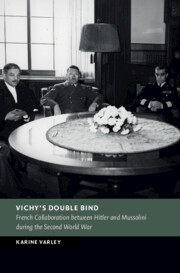Book contents
- Vichy’s Double Bind
- New Studies in European History
- Vichy’s Double Bind
- Copyright page
- Contents
- Acknowledgements
- Introduction
- Part I Diplomacy and Politics
- Chapter 1 Sowing the Seeds
- Chapter 2 Pivoting between Alignments
- Chapter 3 Playing Rome against Berlin
- Chapter 4 Compliance and Defiance
- Chapter 5 The Absence of Collaborationism
- Part II Local Encounters
- Bibliography
- Index
Chapter 3 - Playing Rome against Berlin
December 1940 to March 1942
from Part I - Diplomacy and Politics
Published online by Cambridge University Press: 18 May 2023
- Vichy’s Double Bind
- New Studies in European History
- Vichy’s Double Bind
- Copyright page
- Contents
- Acknowledgements
- Introduction
- Part I Diplomacy and Politics
- Chapter 1 Sowing the Seeds
- Chapter 2 Pivoting between Alignments
- Chapter 3 Playing Rome against Berlin
- Chapter 4 Compliance and Defiance
- Chapter 5 The Absence of Collaborationism
- Part II Local Encounters
- Bibliography
- Index
Summary
This chapter examines how the collapse of the Protocols of Paris negotiations with Berlin and the vulnerability of Italian forces in Libya resulted in a brief but significant experiment in military collaboration between France and Italy. The episode marked a high point in Vichy’s belief that it could manipulate Berlin and Rome to the French advantage. By offering Rome the concessions that Vichy had refused to grant Berlin on the use of Tunisian ports, Darlan sought to fulfil three objectives. The first was to gain concessions on the armistice terms, the second was to use Rome to counterbalance Berlin and the third was to use the Allied threat as a cover to strengthen French defences in North Africa against the threat from Italy. If Vichy’s decision to collaborate with Germany had been taken from a position of weakness and self-delusion, its decision to collaborate with Italy was taken from a position of opportunism. However, the strategy failed to yield any tangible results. Vichy’s brief engagement in military collaboration with Italy was opportunistic and voluntary, but it was also poorly conceived and executed.
Keywords
- Type
- Chapter
- Information
- Vichy's Double BindFrench Collaboration between Hitler and Mussolini during the Second World War, pp. 52 - 76Publisher: Cambridge University PressPrint publication year: 2023



